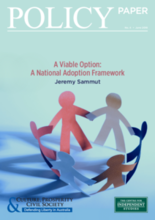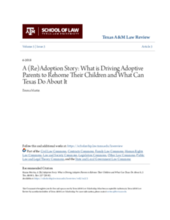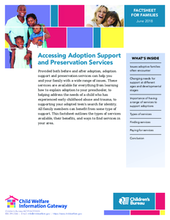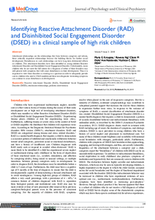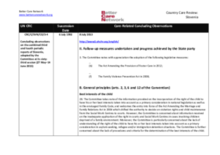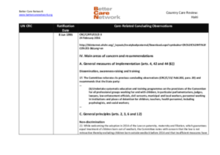Displaying 291 - 300 of 660
This paper outlines key findings from the first comprehensive study of permanence planning in Scotland.
This qualitative study examined disclosure for adult survivors of abandonment. Findings are centred around the experience of disclosure, the process of disclosure specifically exploring the role of half-truths and finally the impact of disclosure on the search for identity and self.
This paper will examine recent initiatives to boost adoptions in New South Wales (NSW) and a way to roll out the core of these reforms nationally.
This paper seeks to contribute to debates about how people's adult lives unfold after experiencing childhood adversity. It presents analysis from the British Chinese Adoption Study: a mixed methods follow-up study of women, now aged in their 40s and early 50s, who spent their infant lives in Hong Kong orphanages and were then adopted by families in the UK in the 1960s.
This Comment will look first at the mechanics behind rehoming—what it is and where it fits into the legal framework of the child welfare system. Next, it will look at the causes of rehoming, focusing specifically on how trauma in a child’s background can create a need for specialized training techniques. Lastly, it will look at other states’ legislation to combat rehoming and suggest different areas where Texas can improve its child welfare laws to both prevent and deter rehoming.
This factsheet outlines the types of adoption support and preservation services available in the U.S., their benefits, and ways to find services in your area.
This comprehensive and authoritative book provides an accessible account of attachment concepts. It traces the pathways of secure and insecure patterns from birth to adulthood, exploring the impact of past experiences of abuse, neglect and separation on children’s behaviour in foster and adoptive families.
This descriptive study involved caregivers and their adopted children, under the age of 7 years old, referred by pediatricians to an outpatient clinic, which specializes in early mental health. The prevalence of toxic stress, measured as symptoms of Reactive Attachment Disorder (RAD) and Disinhibited Social Engagement Disorder (DSED), was explored using clinical data collected during initial assessment.
This Country Care Review includes the care-related concluding observations adopted by the Committee on the Rights of the Child and the Committee on the Rights of Persons with Disabilities, as well as other care-related concluding observations, ratification dates, and links to the Universal Periodic Review and Hague Intercountry Adoption Country Profile.
This country care review includes the care-related Concluding Observations adopted by the Committee on the Rights of the Child and the Committee on the Rights of Persons with Disabilities.

